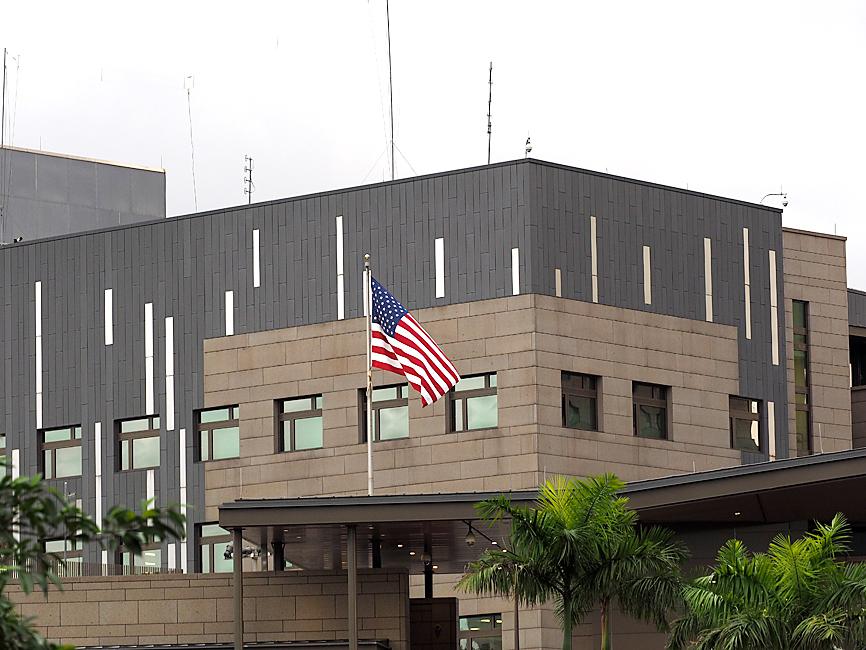US President Donald Trump’s administration on Monday announced that it had approved a US$280 million arms sale package to Taiwan, with local experts saying the sale would upgrade military telecommunications and stimulate industrial development.
The package includes a Field Information Communications System, consisting of 154 communication nodes, 24 communication relays and eight network management systems, the US Defense Security Cooperation Agency said in a press release.
It also involves verification testing, personnel training and training equipment, an initial repair and return program, technical and logistics support services, and contractor-provided training, it said.

Photo: David Chang, EPA-EFE
The proposed sale is designed to provide mobile and secure communications, the agency said, adding that it has notified the US Congress as required.
The principal contractor is currently unknown due to a pending open competition for selection, it said.
Taipei welcomed the potential sale, with the Presidential Office thanking the US for its sixth arms sale this year, and the 11th by the Trump administration.
The sale once again highlights the US government’s substantive actions to fulfill its security commitments under the US’ Taiwan Relations Act and the “six assurances,” and will further strengthen the Taiwanese military’s strategic and defense needs, Presidential Office spokesman Xavier Chang (張惇涵) said in the statement.
Taiwan is determined to be a force for good in safeguarding peace, stability, prosperity and development in the Indo-Pacific region through strong national defense and the deepening of security partnerships with the US and other like-minded countries, he added.
Following the notification procedure, the deal is expected to take effect after one month, the Ministry of National Defense said in a separate statement.
With the new system, Taiwan would be able to upgrade its Improved Mobile Subscriber Equipment (IMSE), Taiwan Security Analysis Center director Mei Fu-hsing (梅復興) said on Facebook yesterday.
The military first introduced the IMSE system in 1996, with the last procurement being made in 2001, he said.
The new system is expected to integrate different combat systems through the 154 nodes that would act as mobile telecommunication base stations, said Su Tzu-yun (蘇紫雲), director of the Division of Defense Strategy and Resources at the government-funded Institute for National Defense and Security Research.
The sale reflects the US’ commitment to developing military-grade broadband communications and encryption techniques with its allies, as stated in its National Defense Authorization Act for Fiscal Year 2021, he said, adding that 5G technology is not yet applied in the military communications.
New demand would drive further research and development, similar to what Taiwan has done by investing in locally upgrading F-16 jets purchased from the US, Su said.

Right-wing political scientist Laura Fernandez on Sunday won Costa Rica’s presidential election by a landslide, after promising to crack down on rising violence linked to the cocaine trade. Fernandez’s nearest rival, economist Alvaro Ramos, conceded defeat as results showed the ruling party far exceeding the threshold of 40 percent needed to avoid a runoff. With 94 percent of polling stations counted, the political heir of outgoing Costa Rican President Rodrigo Chaves had captured 48.3 percent of the vote compared with Ramos’ 33.4 percent, the Supreme Electoral Tribunal said. As soon as the first results were announced, members of Fernandez’s Sovereign People’s Party

MORE RESPONSIBILITY: Draftees would be expected to fight alongside professional soldiers, likely requiring the transformation of some training brigades into combat units The armed forces are to start incorporating new conscripts into combined arms brigades this year to enhance combat readiness, the Executive Yuan’s latest policy report said. The new policy would affect Taiwanese men entering the military for their compulsory service, which was extended to one year under reforms by then-president Tsai Ing-wen (蔡英文) in 2022. The conscripts would be trained to operate machine guns, uncrewed aerial vehicles, anti-tank guided missile launchers and Stinger air defense systems, the report said, adding that the basic training would be lengthened to eight weeks. After basic training, conscripts would be sorted into infantry battalions that would take

GROWING AMBITIONS: The scale and tempo of the operations show that the Strait has become the core theater for China to expand its security interests, the report said Chinese military aircraft incursions around Taiwan have surged nearly 15-fold over the past five years, according to a report released yesterday by the Democratic Progressive Party’s (DPP) Department of China Affairs. Sorties in the Taiwan Strait were previously irregular, totaling 380 in 2020, but have since evolved into routine operations, the report showed. “This demonstrates that the Taiwan Strait has become both the starting point and testing ground for Beijing’s expansionist ambitions,” it said. Driven by military expansionism, China is systematically pursuing actions aimed at altering the regional “status quo,” the department said, adding that Taiwan represents the most critical link in China’s

EMERGING FIELDS: The Chinese president said that the two countries would explore cooperation in green technology, the digital economy and artificial intelligence Chinese President Xi Jinping (習近平) yesterday called for an “equal and orderly multipolar world” in the face of “unilateral bullying,” in an apparent jab at the US. Xi was speaking during talks in Beijing with Uruguayan President Yamandu Orsi, the first South American leader to visit China since US special forces captured then-Venezuelan president Nicolas Maduro last month — an operation that Beijing condemned as a violation of sovereignty. Orsi follows a slew of leaders to have visited China seeking to boost ties with the world’s second-largest economy to hedge against US President Donald Trump’s increasingly unpredictable administration. “The international situation is fraught